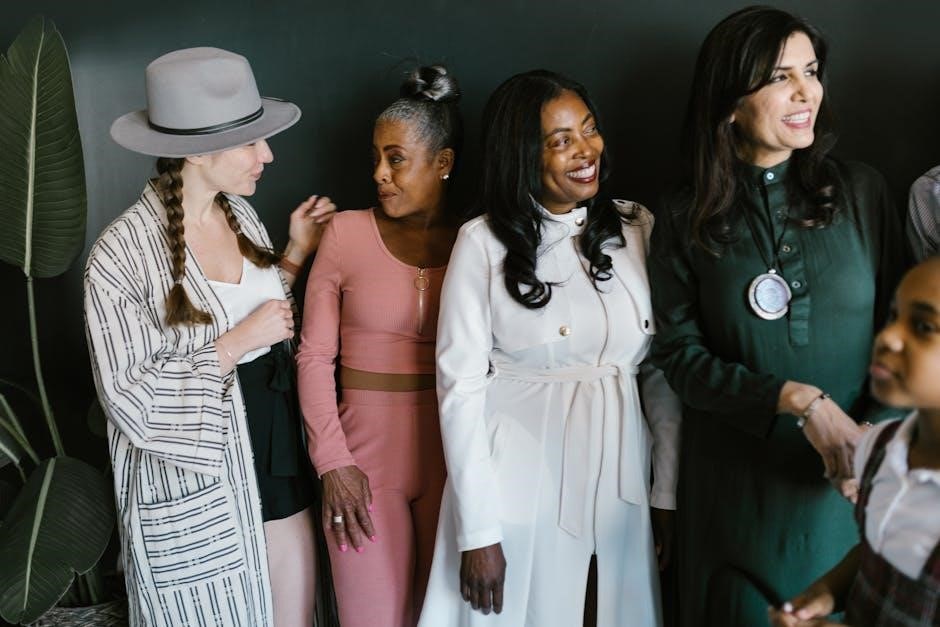Bell Hooks’ “Feminism is for Everybody” is a concise primer that defines feminism as a movement to end sexism, emphasizing its relevance for all people, regardless of gender, race, or class. Hooks’ accessible writing makes the book an essential read for understanding modern feminist theory and its transformative potential in everyday life.
Overview of Bell Hooks’ Vision of Feminism
Bell Hooks envisions feminism as an inclusive movement that seeks to dismantle systems of oppression, including sexism, racism, and classism. She argues that feminism is not solely for women but for everyone, emphasizing the need to challenge and transform societal structures that perpetuate inequality. Hooks critiques narrow definitions of feminism that exclude marginalized voices, advocating instead for an intersectional approach that recognizes the interconnected nature of race, gender, and class. Her vision emphasizes education, personal responsibility, and collective action as essential tools for creating a more just and equitable society. By framing feminism as a movement for liberation, Hooks invites everyone to participate in dismantling patriarchal norms and building a world where all individuals can thrive.
Why the Book is Essential for Understanding Modern Feminism
Bell Hooks’ “Feminism is for Everybody” is a foundational text that provides a clear and accessible introduction to feminist theory and practice. The book is essential for understanding modern feminism because it addresses the intersections of race, gender, and class, offering a holistic perspective that is often missing in mainstream feminist discourse. Hooks challenges stereotypes and misconceptions about feminism, emphasizing its relevance to all people. By focusing on the transformative potential of feminism, the book encourages readers to think critically about their roles in creating a more equitable society. Its concise and engaging style makes it a valuable resource for both newcomers and seasoned feminists, ensuring its continued relevance in contemporary discussions about gender and justice.

Key Concepts in Bell Hooks’ “Feminism is for Everybody”
Feminism is for Everybody explores intersectionality, challenging sexist role patterns, and ending sexism. Hooks emphasizes that feminism benefits everyone, advocating for liberation and equity across race, gender, and class.
Definition of Feminism as a Movement to End Sexism

Bell Hooks defines feminism as a movement to end sexism, sexist exploitation, and oppression, emphasizing its inclusive vision for collective liberation. She argues that feminism is not solely for women but for everyone, challenging systems of domination and inequality. Hooks critiques societal structures that perpetuate gender-based oppression, advocating for a world where all individuals can thrive free from sexist constraints. Her definition underscores the importance of addressing intersecting forms of oppression, such as race and class, to achieve true equality. By redefining feminism as a transformative force, Hooks invites everyone to participate in dismantling harmful gender roles and building a more just society.
The Importance of Intersectionality in Feminist Theory
Bell Hooks highlights the importance of intersectionality in feminist theory, emphasizing how race, gender, and class intersect to shape experiences of oppression. She argues that traditional feminist movements often overlooked the unique struggles of women of color and marginalized groups. Hooks advocates for an inclusive approach that acknowledges these intersections, ensuring that feminism addresses the diverse realities faced by all individuals. By integrating intersectionality, Hooks expands the scope of feminism, making it a more equitable and powerful force for change. This approach ensures that no group is left behind in the fight against sexism and oppression, fostering solidarity and collective liberation.
Challenging Sexist Role Patterns and Patriarchy
Bell Hooks emphasizes the need to dismantle sexist role patterns and patriarchy, which perpetuate inequality and limit human potential. She argues that both men and women are trapped by these systems, often unknowingly perpetuating oppression. Hooks advocates for a radical rethinking of gender roles, encouraging individuals to question and challenge societal norms that reinforce sexism. By rejecting rigid definitions of masculinity and femininity, people can foster a more equitable society. Liberation from these constraints benefits everyone, allowing for authentic expression and mutual respect. Hooks’ work calls for collective action to dismantle patriarchal structures, promoting a world where individuals can thrive beyond the confines of sexist expectations.

The Relevance of Feminism for Everyone
Feminism is essential for all, as it addresses systemic inequalities and promotes liberation from oppressive structures, benefiting both men and women by fostering equality and justice.
Feminism as a Movement for Liberation
Bell Hooks emphasizes that feminism is a movement for liberation, seeking to free both men and women from oppressive sexist role patterns and patriarchy. Hooks argues that true liberation requires the dismantling of systems that perpetuate inequality and domination. By challenging these structures, feminism creates space for individuals to embrace their full humanity, fostering a society rooted in mutual respect and equality. Hooks’ vision extends beyond gender, addressing intersections of race, class, and sexuality, making feminism a transformative force for collective liberation and social justice. This inclusive approach highlights feminism’s relevance and necessity for everyone.
Breaking Down Barriers: Race, Gender, and Class
Bell Hooks underscores the importance of addressing the intersections of race, gender, and class in feminist theory and practice. She critiques the historical exclusion of marginalized voices, particularly those of Black women, from mainstream feminist movements. Hooks argues that true liberation cannot be achieved without dismantling the interlocking systems of oppression that affect women differently based on their race and class. By emphasizing intersectionality, she calls for a more inclusive feminism that acknowledges diverse experiences and challenges. This approach ensures that the movement addresses the unique struggles of all individuals, fostering equity and justice across societal divides. Hooks’ work highlights the necessity of breaking down these barriers to create a more unified and equitable feminist movement.
How Feminism Benefits Both Men and Women
Bell Hooks highlights that feminism benefits both men and women by challenging rigid gender roles and fostering equality. She argues that traditional notions of masculinity and femininity restrict individuals, limiting their potential. Feminism liberates men from toxic expectations of dominance and emotional suppression, allowing them to express vulnerability and nurturing qualities. Similarly, women gain freedom from oppressive gender roles, enabling them to pursue diverse opportunities. Hooks emphasizes that sexism harms everyone, and its dismantling creates a more equitable society where both genders can thrive. By promoting mutual respect and collaboration, feminism empowers men and women to build healthier relationships and share responsibilities, ultimately benefiting all individuals and society as a whole.

Critique of Sexism and Oppression
Bell Hooks critiques systemic sexism and oppression, emphasizing how these structures perpetuate inequality and harm both men and women. Her work advocates for dismantling these systems to foster true gender equity and liberation for all.
The Role of Education in Promoting Feminist Values
Bell Hooks emphasizes education as a powerful tool for promoting feminist values. She argues that by integrating feminist theory into educational systems, individuals can gain a deeper understanding of gender equality and the need to dismantle oppressive structures. Hooks advocates for critical thinking and dialogue in classrooms, encouraging students to question societal norms and challenge sexism. Education, she believes, empowers individuals to recognize and resist systems of oppression, fostering a more equitable society. By making feminist ideas accessible and relatable, Hooks ensures that education becomes a cornerstone of transformative change, benefiting both men and women.
Personal and Collective Responsibility in Feminist Practice
Bell Hooks stresses the importance of both personal and collective responsibility in advancing feminist ideals. She encourages individuals to critically examine their own beliefs and actions, recognizing how they may perpetuate or challenge systems of oppression. Hooks also highlights the necessity of collective action, where communities work together to dismantle structures of inequality. By fostering accountability at both personal and societal levels, feminism becomes a transformative force that empowers individuals to create meaningful change. This dual approach ensures that the feminist movement remains inclusive and impactful, driving toward a more just and equitable world for all.

Feminism in Everyday Life
Bell Hooks illustrates how feminist principles can transform daily interactions, emphasizing the importance of applying feminist values to love, relationships, and spirituality in personal and societal contexts.

Feminist Perspectives on Love, Relationships, and Spirituality
Bell Hooks redefines love, relationships, and spirituality through a feminist lens, advocating for mutual respect, trust, and communication. She challenges traditional gender roles that often perpetuate inequality, emphasizing the need for emotional and spiritual connection in partnerships; Hooks argues that true liberation encompasses not only societal change but also personal transformation, urging individuals to embrace love as an act of resistance against oppressive systems. By integrating spirituality into feminist thought, she offers a holistic vision of relationships rooted in equality and empathy, fostering healthier connections that empower individuals and communities alike.

Practical Steps to Apply Feminist Principles
Bell Hooks emphasizes the importance of education and critical thinking in applying feminist principles. She encourages individuals to challenge sexist stereotypes and engage in self-reflection to recognize their own privileges and biases. Hooks advocates for collective action, such as supporting policies that promote gender equality and addressing systemic inequalities. She also highlights the value of fostering open, respectful dialogue across race, gender, and class divides. By integrating feminist values into daily life, individuals can promote inclusivity and empathy. Hooks further emphasizes the need to support organizations and initiatives that align with feminist goals, ensuring that the movement remains accessible and transformative for everyone.

Bell Hooks’ legacy underscores the enduring relevance of feminism as a movement for equality and liberation. Her work inspires collective action, ensuring feminism remains inclusive and transformative for all.
Bell Hooks’ Legacy and the Ongoing Fight for Equality
Bell Hooks’ work has left an indelible mark on feminist theory and practice. Her emphasis on inclusivity and intersectionality has broadened the scope of feminism, making it accessible to diverse groups. Hooks’ advocacy for ending sexism, racist exploitation, and oppression continues to inspire new generations of activists and scholars. Her writings, including Feminism is for Everybody, have become foundational texts, encouraging dialogue and action toward a more equitable society. Hooks’ legacy lies in her ability to connect academic theory with everyday life, ensuring that feminism remains a powerful force for change and liberation for all people.

Encouraging Participation in the Feminist Movement
Bell Hooks’ work passionately invites everyone to engage with feminism, emphasizing its relevance for all genders, races, and classes. She challenges stereotypes that feminism is only for women or intellectual elites, advocating for a movement that liberates everyone from oppressive systems. Hooks encourages individuals to embrace feminism as a transformative force, breaking down barriers of race, gender, and class. Her writings inspire personal and collective responsibility, urging people to actively participate in creating a more just and equitable world. By making feminist theory accessible, Hooks empowers individuals to see themselves as agents of change, fostering a sense of community and shared purpose in the fight for equality.




About the author